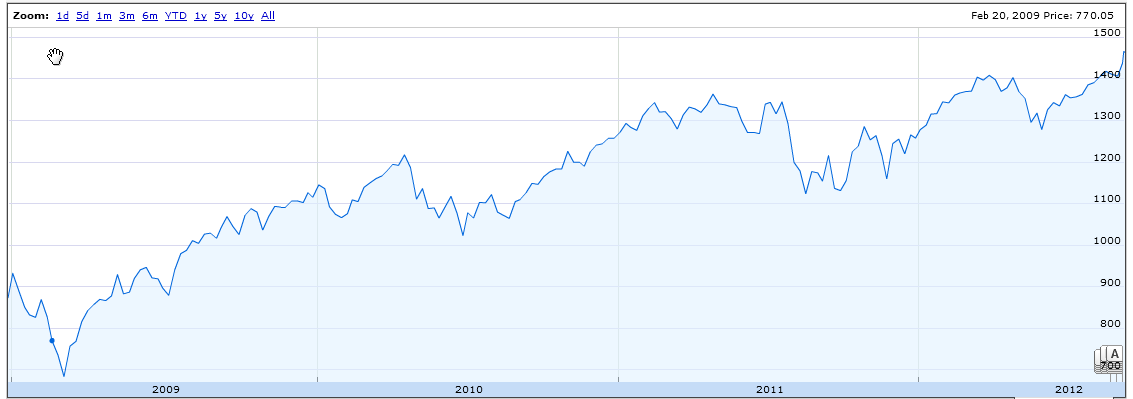 Author: John Gerard Lewis, Gerard Wealth
Author: John Gerard Lewis, Gerard Wealth
Covestor model: Stable High Yield
The U.S. government, even with the only printing press that can legally print money, is not a top-notch credit risk. That feather in Uncle Sam’s cap was plucked by the rating agencies last year, leaving him with just two “A’s” instead of three.
They also left investors with one less reason to effectively pay the old guy merely for storing their funds in his vault. These days, they’re willing to do just about anything to hold onto their money, even if it means actually paying Uncle just to hold it.
But with inflation at 2.3%, anyone who invests in a 10-year Treasury bond is losing more than 60 basis points (0.60%) in purchasing power (as of June 7). That’s a losing proposition.
The salad days of insouciant investing come and gone. Oh, a AA-rated bond is certainly investment worthy. Heck, you’d have to descend below BBB- to drop out of the investment-grade zone. And there is that printing press. But when the Treasury’s paltry returns fail to compensate for the heightened credit risk, investors have to look elsewhere.
What they’re not finding is an equivalent to the vaporized AAA-rated government bonds. There are, of course, investment-grade corporates that can return nearly 8% over 10 years, but they’re not AAA. They’re in the BBB category. The best yields for AAA 10-year corporates are in the 2% range. And since today’s inflation rate is 2.3% (April 2012), they’re providing a negative real return, just as the Treasuries are.
But you may already hold a stellar investment that has an effective credit rating that surpasses even the AAA-rated Treasuries of the past: your home mortgage.
Your mortgage represents an investment opportunity that has an infinitely good credit rating. For the sake of saving bandwidth, we’ll call it AAA+, although an infinite number of A’s could be attached.
Paying debt is riskless. It is not subject to the creditworthiness of the other party, as is the case with an investment in bonds. Unless there are other contingencies such as a prepayment penalty (which we’ll deem to be nonexistent for our illustration), the mortgagor is in complete control of the “investment.”
It’s as if you had issued a bond and called it in because it’s simply in your best interest to do so. That’s what bond issuers do when the rates they are paying to bondholders are higher than prevailing market rates. And that’s the case today for many homeowners, even if they’ve refinanced within the past few years.
Their mortgage rates are higher than the highest-quality investment alternatives. “Calling-in” their mortgages would therefore be their best “investment.”
Let’s look at an example:
Assume that you took out a 30-year, $300,000 mortgage at 3.75%. Your principal and interest payment is thus $1,389 per month. The current loan balance is $250,000 and you are in the 33% marginal tax bracket (because you make, say, $225,000 a year). Is it better to pay off this mortgage or to invest that lump sum elsewhere?
Well, we first have to identify “elsewhere.” It would need to have the same “credit rating” as your mortgage, to which we have already assigned a AAA+ rating. Frankly, nothing else does, but the best available would be something that is U.S. government guaranteed.
One possibility would be a bank certificate of deposit. The national average for a C.D., with FDIC insurance up to $250,000, is 1.11% for a five-year term (as of June 7).
Another would be a Treasury bond. The 10-year bond, backed by Uncle’s full faith and credit, is yielding 1.65%. (Sure, the 30-year bond is yielding 2.75%, but who would want to get locked into that for three decades?)
We’ll be generous and boost the “elsewhere” yield to an assumed 2%. Now let’s compare.
After taxes, the mortgage would cost you 2.51% while your after-tax return on a 2% investment would be 1.34%. You would thus get a 1.17% higher rate of return by paying off the debt.
If your mortgage rate is 4.5%, your return would be 1.67% better by paying it off. And if you still hadn’t refinanced, and are lugging around a 5.25% mortgage, your return would be 3.25% better.
And there’s the intangible benefit:
Paying off a mortgage with a lump sum provides a different kind of “psychic income” than that which accompanies making extra principal payments over the life of the loan. The latter is that of the “mortgage burning” variety, where the middle class couple celebrates the end of the long haul.
For a lump-sum payoff, the psychic income is knowing that the better investment has been chosen.




